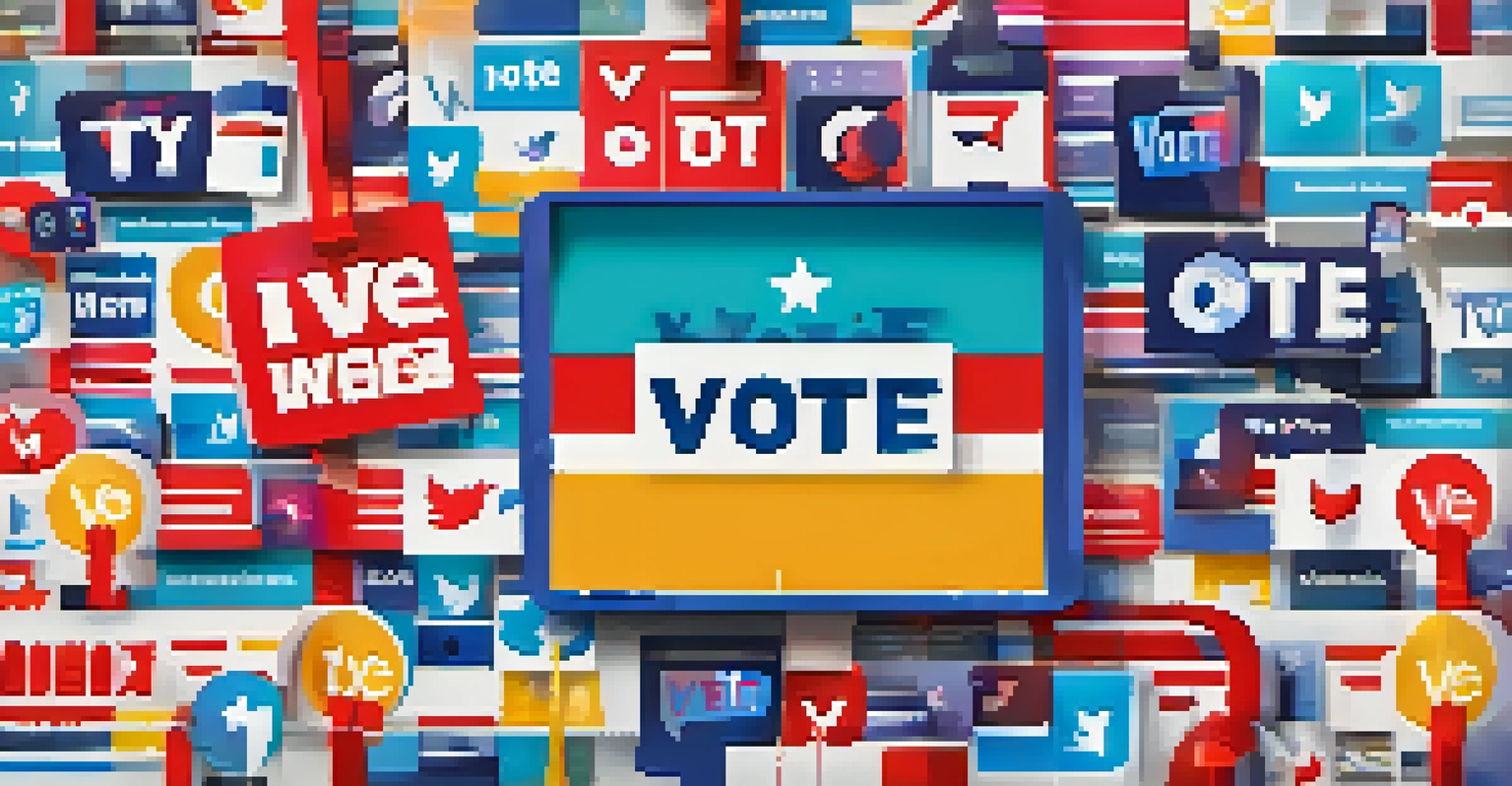Voter Engagement Strategies in Massachusetts: A Case Study

Understanding Voter Engagement in Massachusetts
Voter engagement is crucial for a healthy democracy, especially in Massachusetts, where active participation shapes local and state policies. It involves not just getting people to vote but also educating them about the process and the importance of their voice. In a state known for its rich political history, fostering engagement can lead to informed citizens who feel empowered to influence their government.
Voting is the foundation stone for political action.
In Massachusetts, various organizations have taken the helm in promoting voter engagement, using innovative strategies to reach diverse communities. These efforts often include outreach programs in schools, community centers, and social media campaigns that resonate with younger voters. By tailoring messages to specific demographics, these organizations ensure that everyone feels included in the electoral process.
Ultimately, understanding the dynamics of voter engagement allows for the development of strategies that not only increase turnout but also build a sense of civic responsibility among residents. As we explore successful case studies from Massachusetts, we will uncover the practices that have made a significant impact in mobilizing voters.
The Role of Technology in Voter Engagement
In today’s digital age, technology plays a vital role in enhancing voter engagement strategies. Massachusetts has embraced various digital platforms to simplify the voting process and reach a broader audience. From mobile apps that provide information on polling locations to social media campaigns that encourage registration, technology has transformed how voters interact with the electoral system.

For instance, organizations have utilized text messaging and email reminders to encourage voters to participate in upcoming elections. These tools not only serve as gentle nudges but also provide vital information, such as deadlines and voting rights. The ease of access to information means that voters are more likely to stay informed and engaged.
Voter Engagement Empowers Citizens
Active voter engagement in Massachusetts fosters informed citizens who feel empowered to influence their government.
Moreover, technology can bridge the gap for underrepresented communities, offering resources in multiple languages and formats. By leveraging digital tools, Massachusetts has made significant strides in creating a more inclusive environment for voting, ensuring that all voices are heard and valued in the democratic process.
Community-Based Initiatives: A Local Approach
One of the most effective voter engagement strategies in Massachusetts is the emphasis on community-based initiatives. Local organizations often partner with schools, churches, and neighborhood groups to foster a culture of voting. These grassroots efforts create a sense of ownership and responsibility among community members, encouraging them to participate actively in elections.
The most powerful tool to change the world is a vote.
For example, community events and forums allow residents to discuss local issues and understand how their votes can impact those matters. By facilitating open conversations, these initiatives not only inform but also empower individuals to see the importance of their engagement. When people feel connected to their community, they are more likely to vote.
Additionally, these initiatives often include targeted outreach to marginalized groups, ensuring that everyone has the opportunity to participate. By focusing on local needs and concerns, Massachusetts can create tailored strategies that resonate with voters and inspire them to take action, ultimately boosting turnout.
Collaboration Among Organizations: Strength in Unity
Collaboration among various organizations has proven to be a powerful strategy for increasing voter engagement in Massachusetts. By joining forces, these groups can share resources, pool their expertise, and amplify their messages. This unity helps create a more robust outreach effort that can reach a wider audience, ultimately driving higher voter turnout.
For instance, coalitions of civic organizations, nonprofits, and educational institutions often come together to host voter registration drives and informational workshops. These collaborative efforts not only streamline resources but also create a sense of community around the voting process. When organizations work together, they can tackle challenges more effectively and inspire more citizens to participate.
Technology Enhances Voting Access
Digital platforms and tools in Massachusetts simplify the voting process and ensure broader access to vital information.
Moreover, collaboration fosters innovation, as different groups bring unique perspectives and ideas to the table. This diversity in approach can lead to the development of new strategies that resonate with various demographics, ensuring that every voice is heard and valued. The power of collaboration in Massachusetts highlights how working together can yield significant results in voter engagement.
Educational Programs: Informing Future Voters
Educational programs play a key role in voter engagement, particularly in Massachusetts, where initiatives target students and young voters. By integrating civic education into school curriculums, students learn about their rights and responsibilities as voters from an early age. This foundational knowledge is crucial in shaping informed citizens who feel confident participating in elections.
Programs often include interactive workshops, simulations of the voting process, and discussions about current events, which help demystify the electoral process. Engaging students in meaningful conversations about democracy can ignite a passion for civic engagement, encouraging them to become lifelong voters. When young people understand the impact of their votes, they are more likely to participate in elections.
Furthermore, collaborating with local universities and colleges can enhance these educational efforts, providing students with resources and opportunities to engage in the electoral process. By investing in the education of future voters, Massachusetts lays the groundwork for a politically active and informed citizenry, strengthening democracy for generations to come.
Utilizing Social Media for Voter Outreach
In an age where social media dominates communication, Massachusetts has effectively utilized these platforms for voter outreach. Social media campaigns can quickly spread information, mobilizing communities to register and vote. By crafting engaging content that resonates with different demographics, organizations can capture the attention of potential voters and inspire them to take action.
For example, platforms like Instagram and TikTok allow organizations to share creative videos that explain the voting process or highlight important dates. These visually appealing posts make the information more accessible and relatable, particularly to younger audiences. The more engaging the content, the more likely it is to be shared, amplifying the reach of these voter engagement efforts.
Community Initiatives Boost Turnout
Grassroots efforts and community partnerships in Massachusetts create a sense of ownership, encouraging more residents to participate in elections.
Additionally, social media serves as a space for dialogue, where voters can ask questions and share their experiences. This two-way communication fosters a sense of community and support, encouraging individuals to participate in the electoral process. By harnessing the power of social media, Massachusetts organizations can create a dynamic and interactive environment that promotes voter engagement.
Evaluating the Impact of Voter Engagement Efforts
To understand the effectiveness of voter engagement strategies in Massachusetts, it's essential to evaluate their impact regularly. This evaluation process involves analyzing voter turnout data, gathering feedback from community members, and assessing the overall effectiveness of various initiatives. By being reflective and adaptive, organizations can refine their approaches to better serve their communities.
For instance, post-election surveys can provide valuable insights into what strategies resonated with voters and what areas may need improvement. By actively seeking feedback, organizations can identify best practices and replicate successful strategies in future elections. Continuous evaluation helps ensure that voter engagement efforts remain relevant and effective.

Moreover, tracking changes in voter turnout among different demographics can shed light on which engagement methods are yielding positive results. This data-driven approach allows for informed decision-making, ensuring that resources are allocated to initiatives that have the most significant impact. By prioritizing evaluation, Massachusetts can continue to enhance its voter engagement strategies and strengthen the democratic process.